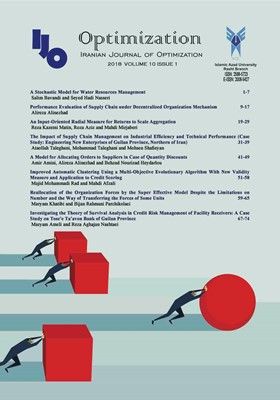The Impact of Supply Chain Management on Industrial Efficiency and Technical Performance (Case Study: Engineering New Enterprises of Guilan Province, Northern of Iran)
Subject Areas : Supply Chain Management
Ataollah Taleghani
1
,
Mohammad Taleghani
2
![]() ,
Mohsen Shafieyan
3
*
,
Mohsen Shafieyan
3
*
![]()
1 - B.S. Student of Industrial Engineering, University of Guilan, Raht, Guilan, Iran
2 - Department of Industrial management, Islamic Azad University, Rasht, Iran
3 - PhD Student of Industrial Management, Department of Management, Rasht Branch, Islamic Azad University, Rasht, Iran
Keywords: supply chain management, Guilan Province, technical performance, industrial efficiency, new enterprises,
Abstract :
An important issue for suppliers, producers, and retailers who want to compete in a competitive environment is continuous performance improvement in a dynamic supply chain. Literature review on supply chain puts more emphasis on quantitative factors than other factors. In this research, we focus on quantitative factors which affect competitive advantages creation and investigation. Our goal is to examine the qualitative factors which affect the supply chain management (e.g. supply chain uncertainty, plant location, and manufacturing practices) based on performance evaluation models and at last we give some solutions to improve the performance. Questionnaire was used to collect data and regression statistical method to examine the research hypothesis. According to the results, plant location, supply chain uncertainty and manufacturing practices factors influenced petrochemical industry supply chain performance.
Addo-Tenkorang, R., & Helo, P. T. (2016). Big data applications in operations/supply-chain management: A literature review. Computers & Industrial Engineering, 101, 528-543.
Bhatnagar, R., & Sohal, A. S. (2005). Supply chain competitiveness: measuring the impact of location factors, uncertainty and manufacturing practices. Technovation, 25(5), 443-456.
Cai, J., Liu, X., Xiao, Z., & Liu, J. (2009). Improving supply chain performance management: A systematic approach to analyzing iterative KPI accomplishment. Decision support systems, 46(2), 512-521.
Cai, X., Chen, J., Xiao, Y., Xu, X., & Yu, G. (2013). Fresh-product supply chain management with logistics outsourcing. Omega, 41(4), 752-765.
Chopra, S., & Meindl, P. (2015). Supply chain management: Strategy, planning, and operation (6th edition). N.J.: Pearson Education.
Christopher, M. (2011). Logistics and Supply Chain Management (4th edition). Harlow: England Financial Times Prentice Hall.
Davis, G.F., & Cobb, J.A. (2010). Chapter 2 resource dependence theory: Past and future, in Claudia Bird Schoonhoven, Frank Dobbin (ed.) Stanford's Organization Theory Renaissance, 1970-2000 (Research in the Sociology of Organizations, Volume 28) Emerald Group Publishing Limited, 21-42.
Esteve-Perez, S., & Manez-Castillejo, J.A. (2008). The Resource-Based Theory of the Firm and Firm Survival. Small Business Economics, 30(3), 231-249.
Harrison, D. (2004). Is a long term business relationship disengagement. Journal of Management studies, 41(1).107-125.
Jayaram, J., Dixit, M., & Motwani, M. (2014). Supply chain management capability of small and medium sized family businesses in India: A multiple case study approach. International Journal of Production Economics, 147(B), 472-485.
Kanda, A.A., & Deshmukh, S. G. (2008). Supply chain coordination: perspectives, empirical studies and research directions. International journal of production Economics, 115(2), 316-335.
Kozlenkova, I. V., Hult, G. T. M., Lund, D. J., Mena, J. A., & Kekec, P. (2015). The role of marketing channels in supply chain management. Journal of Retailing, 91(4), 586-609.
Lund, D. J., & Marinova, D. (2014). Managing revenue across retail channels: The interplay of service performance and direct marketing. Journal of Marketing, 78(5), 99-118.
Mollenkopf, D., Stolze, H., Tate, W. L., & Ueltschy, M. (2010). Green, lean, and global supply chains. International Journal of Physical Distribution & Logistics Management, 40(1/2), 14-41.
Rajeev, A., Pati, R.K., Padhi, S.S., & Govindan, K. (2017). Evolution of sustainability in supply chain management: A literature review. Journal of Cleaner Production, 162(20), 299-314.
Sodhi, M. M. S., Tang, C. S. (2011). The incremental bullwhip effect of operational deviations in an arborescent supply chain with requirements planning. European Journal of Operational Research, 215(2), 374-382.
Taleghani, M., & Asgari, M.H., & Modabbernia, Y. (2014). Industrial Marketing (Concepts & Applications). Publisher: Islamic Azad University (Rasht Branch), Rasht, Iran. (In Persian).
Thakkar, J. & Kanda, A., & Deshmukh͵ S. G. (2009).Supply chain performance measurement framework for small and medium scale enterprises. Benchmarking: An International Journal, 16(5), 702-723

